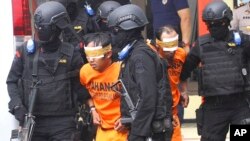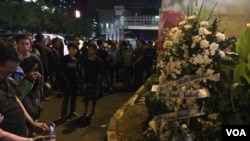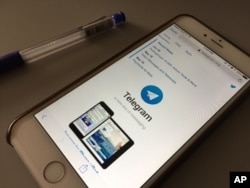A raft of recent moves by the Indonesian government to curb the presence of hardliners and terrorists has human rights activists worried.
Last week came a presidential decree banning the hardline group Hizbut Tahrir (HTI), which advocates for a global Islamic caliphate. Then came proposed revisions to the national counterterrorism law that are “overbroad, vague, and would unjustifiably restrict basic rights,” according to Human Rights Watch.
Finally, on Friday, the country banned the encrypted messaging application Telegram, citing its popularity among extremist and radical groups.
Activists say the combination of actions present a considerable threat to Indonesian civil liberties. Some think they constitute a reaction to the visibility of political Islam during the contentious Jakarta gubernatorial election, when hardliner groups showed their power by staging huge rallies in the capital city.
“The awareness was heightened with the anti-Ahok protests,” said Andreas Harsono, of Human Rights Watch. “It was a wake up call.” But now he worries the pendulum may have swung too far in the other direction.
HTI ban
The Indonesian parliament has a year to approve or reject the presidential decree banning HTI, which President Joko “Jokowi” Widodo issued at the behest of 14 Islamic organizations, including Nahdlatul Ulama, the world’s largest Sunni body.
Hizbut Tahrir, founded in 1953, is a “pan-Islamist” group based in London that seeks to create a caliphate of Muslim-majority countries from Morocco to the Philippines. It is already banned in 12 countries, including Germany, Saudi Arabia, and Uzbekistan.
The decree comes after months of hints and speculation from the Indonesian police, dating to even before the verdict against Jakarta’s Christian governor Ahok, who was sentenced to two years in jail for blasphemy.
HTI is “intolerant, highly disciplined but non-violent,” according to Sidney Jones of the Institute for Policy Analysis and Conflict.
“It is loathed by moderate members of the two largest Muslim social organizations in Indonesia, Nahdlatul Ulama and Muhammadiyah, which have seen it take over many of their schools and mosques,” writes Jones.
Jones said the case against HTI was levied clumsily, using rhetoric of preserving Pancasila, Indonesia’s national political philosophy.
Harsono drew parallels to President Suharto’s presidential decree against the Indonesian Communist Party in 1966, which came on the heels of the infamous anti-communist purge that killed about 500,000 people.
"The Indonesian government’s decision to ban Hizbut Tahrir constitutes a troubling violation of universal rights of freedom of association and expression,” said Harsono.
Counterterrorism law revisions
The effort to revise Indonesia’s counterterrorism laws dates to January 2016, when IS-linked bombings in Jakarta killed eight people, including the four attackers.
The proposed edits would allow the country to revoke citizenship for people suspected of going abroad to join wars or engage in terrorism. It also would criminalize “speech, thought, behavior or writings” linked to “actions which adversely impact other people/communities.”
It’s the second part that concerns many observers.
“The Indonesian government has legitimate concerns about terrorism, but disregarding basic rights will only undermine efforts to address the threat,” said Harsono.
President Joko “Jokowi” Widodo linked the amendments with the phenomenon of foreign fighters in the southern Philippines, where security forces are trying to beat back a militant siege.
There are a number of Indonesian nationals among the militant ranks in the city of Marawi.
Telegram block
On Friday, the Indonesian Communications Ministry abruptly announced a ban on Telegram, a mobile messaging app that has become the medium of choice for several extremist groups, including the so-called Islamic State.
The next day, Communications Minister Rudiantara threatened all social media platforms that they too could be blocked if they don’t step up efforts to filter radical content.
That seems unlikely in a country as social-media-proficient as Indonesia.
Still, the government “exceeded its authority” in banning Telegram, said Damar Juniarto, founder of the Digital Democracy Forum. It is ironic, he said, that “Telegram is actually one of the first apps to actively fight online radicalism through internal channels such as @isiswatch.”
Telegram founder Pavel Durov said he has contacted the Ministry of Communications since the ban was announced and is “confident we can efficiently eradicate terrorist propaganda without disrupting the legitimate use of Telegram by millions of Indonesians.”
But just as extremists took up apps like Telegram as a refuge from crackdowns on Facebook and Twitter, they will likely adapt even if the ban is upheld. As of Friday, according to one observer, Indonesian IS-sympathizers had already moved on to a platform called “Baaz.”












